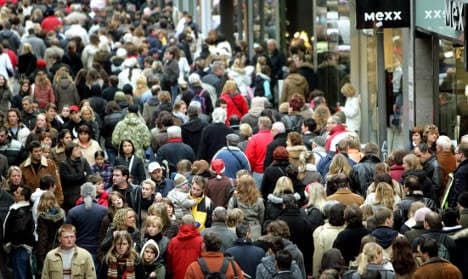One in five in Germany have 'migrant roots'

A fifth of people living in Germany have foreign roots, figures released to coincide with International Migrants Day show. This is an 8.5 percent rise since 2005.
There were 16.3 million people with migrant roots living in Germany in 2012, according to the Federal Statistics Office. Of them, 10.9 million are people who have returned from abroad since 1949 and 5.4 million are the children of those returning migrants.
Over 70 percent came from Europe and almost a third came from an EU member state. A further 15.7 of migrants came from Asia, 3.5 percent from Africa and 2.5 percent from the United States. Just 0.2 percent came from Australia or Oceania.
Just over seven percent of people with migrant roots cannot be classified into any one category. This applies, for example, to children whose parents have different nationalities.
A spokesman for the federal statistics office Destasis, which collated the data, told The Local there was an accepted definition of 'people with migrant roots' - migrationshintergrund in German.
Obviously all migrants themselves count, as do their children - and any further generations who do not take German citizenship. Should the initial migrant get German citizenship, and their children be born as Germans in Germany, both of those first generations are counted as having migrant roots.
Only the second generation that has been born as Germans in Germany lose that label, he said.
Migration to Germany surged at the end of the 1950's with the arrival of so-called "guest workers" to boost the country's post-war recovery.
The 1980's saw an increase in the number of people seeking asylum in the country, while the following decade was characterized by the return of ethnic Germans from eastern Europe. More recently, the Eurozone financial crisis has attracted many southern Europeans into the country.
While the portion of second generation migrants has undergone a significant rise, the number of people arriving in Germany exceeded that of second-generation migrants for the first time in 2012.
Comments
See Also
There were 16.3 million people with migrant roots living in Germany in 2012, according to the Federal Statistics Office. Of them, 10.9 million are people who have returned from abroad since 1949 and 5.4 million are the children of those returning migrants.
Over 70 percent came from Europe and almost a third came from an EU member state. A further 15.7 of migrants came from Asia, 3.5 percent from Africa and 2.5 percent from the United States. Just 0.2 percent came from Australia or Oceania.
Just over seven percent of people with migrant roots cannot be classified into any one category. This applies, for example, to children whose parents have different nationalities.
A spokesman for the federal statistics office Destasis, which collated the data, told The Local there was an accepted definition of 'people with migrant roots' - migrationshintergrund in German.
Obviously all migrants themselves count, as do their children - and any further generations who do not take German citizenship. Should the initial migrant get German citizenship, and their children be born as Germans in Germany, both of those first generations are counted as having migrant roots.
Only the second generation that has been born as Germans in Germany lose that label, he said.
Migration to Germany surged at the end of the 1950's with the arrival of so-called "guest workers" to boost the country's post-war recovery.
The 1980's saw an increase in the number of people seeking asylum in the country, while the following decade was characterized by the return of ethnic Germans from eastern Europe. More recently, the Eurozone financial crisis has attracted many southern Europeans into the country.
While the portion of second generation migrants has undergone a significant rise, the number of people arriving in Germany exceeded that of second-generation migrants for the first time in 2012.
Join the conversation in our comments section below. Share your own views and experience and if you have a question or suggestion for our journalists then email us at [email protected].
Please keep comments civil, constructive and on topic – and make sure to read our terms of use before getting involved.
Please log in here to leave a comment.